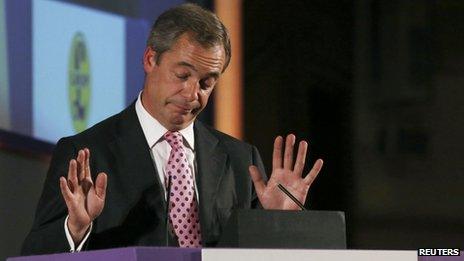UKIP conference: 'Sluts' row leaves Farage livid
- Published

Nigel Farage said Godfrey Bloom had "gone beyond the pale"
For a man who usually oozes confidence, charisma and chutzpah, it was a facial expression that said it all.
Nigel Farage took to the stage with a look of despair, knowing the party's biggest ever conference had been disastrous.
UKIP is 20 years old.
A consistent theme in the party's early and then teenage years was an adolescent capacity for fallouts, walkouts and spats.
By way of a quick example, two MEPs who resigned from the party had parting shots in recent months, describing the leadership as "totalitarian" and like a "Stalinist dictator".
This latest blast of internal combustion came from a reliable source, the Yorkshire and Humber MEP Godfrey Bloom.
'Sluts' comment
His fireworks have included saying British aid should not be sent to "Bongo Bongo Land" and, some years ago, suggesting women should spend their time cleaning behind the fridge.
So who better to address a lunchtime fringe meeting at the conference entitled "Women in Politics".
Yes, the man who sits on the European Parliament's Women's Rights and Gender Equality Committee.
UKIP MEP Godfrey Bloom: "I made a joke and said oh well you're all sluts and everybody laughed including all the women"
He insisted later that when he described the women at the lunch as "sluts" he meant the traditional definition of the word, being dirty or untidy.
Rather, that is, than its more modern meaning suggesting a lady rather generous in her dispersal of affection.
But the damage was done.
And that was before he gave the Channel 4 News reporter Michael Crick a whack around the head with the conference brochure for asking his questions about race.
Mr Bloom - UKIP's defence spokesman - had clearly decided attack was the best form of attack.
Internal tremors
Diane James, a rising star in the party having finished second in the by-election in Eastleigh earlier this year, disowned his reference to "sluts".
Nigel Farage was clearly livid.
And, moments later, party chairman Steve Crowther said Mr Bloom had been kicked out of the team of UKIP MEPs, having had the whip withdrawn.
Mr Farage had begun the day saying UKIP was "changing the face of British politics".
What he meant was the party was shaping the political debate at Westminster and having influence.
With that growing influence, there has been a conscious attempt by the UKIP leadership in recent months to professionalise the party's image.
The message it wanted to emphasise this weekend was clear: this is a young party, just 20 years old, but it is on the brink of causing what Mr Farage called an "earthquake" in British politics.
But, not for the first time, it was internal tremors that dominated.
Tremors that, for now at least, have shaken the smile from Nigel Farage's face.
- Published20 September 2013
- Published20 September 2013
- Published7 August 2013